Bringing a puppy home is a joyful moment, but it also means teaching them to live indoors. Potty training can seem tough, especially for first-time owners. But it’s crucial for a happy home. Imagine knowing how to potty train a puppy in just 7 days, making life easier for you and your pet. This guide is here to help you through the puppy potty training journey. With patience and consistency, you can quickly train your puppy for lasting success.
Key Takeaways
- Puppies can start basic potty training as early as 8 weeks old.
- Creating a schedule for potty breaks is vital for establishing a routine.
- Understanding your puppy’s signs for needing to go can prevent accidents.
- Crate training helps build a safe space and aids in proper potty behaviour.
- Consistency is key in reinforcing positive behaviours during training.
- Rewards such as treats and praise bolster successful potty habits.
- Patience will be your best friend throughout the potty training process.
Importance of Puppy Potty Training
Potty training your puppy is key to having a well-behaved pet. It stops accidents inside and shows the benefits of housebreaking. A trained puppy means a happier home for everyone. It leads to less stress and more joy with your furry friend.
Choosing the right puppy behaviour training method can make a big difference. It makes the whole process smoother.
Benefits of Housebreaking
Housebreaking has many perks for you and your puppy. It cuts down on stress from accidents inside. Setting regular meal times helps your puppy learn when it’s time to go outside.
Take your puppy out early in the morning and after meals. This helps them get into a routine. Keeping an eye on when your puppy goes outside helps you understand their habits better.
How it Affects Puppy Behaviour
Potty training shapes your puppy’s behaviour. It teaches them where it’s okay to go, making them feel safe. Using crates helps because puppies don’t like to soil their space. They learn to stay clean when trained right.
Give them treats and praise when they go outside to encourage good behaviour. Remember, puppies can hold their bladder for an hour for each month of age. So, taking them out often can help prevent accidents.
Understanding Puppy Development

Knowing how your puppy grows is key to successful potty training. You might ask at what age a puppy be potty trained. Training can start at eight weeks, but by 12 weeks, puppies get better at learning. They can hold their bladder for about two hours in a crate, making training easier.
What Age Should You Start Potty Training?
Starting potty training at the right time is important. Puppies learn fast, so training at eight weeks works well. A consistent routine helps them learn better. By 12 weeks, they understand more, making training easier.
You should adjust your training based on their age and growth. This helps make training more effective.
Puppy Bladder Control and Its Limitations
Knowing about puppy bladder control helps with potty training. A three-month-old puppy can stay crate-trained for about four hours. By six months, they can hold it for four hours, too. This means you can plan breaks better.
Take your puppy out every two hours during the day, especially after meals and play. This helps you know when to take them out. Adjust your schedule to fit their needs for better training.
Understanding puppy growth and bladder control helps with training. Watch your puppy and change your training as they grow.
Essential Supplies for Potty Training
Getting ready for your puppy’s potty training is key to success. You’ll need the right items to help you and your puppy learn. Knowing what you need and how to arrange your space makes training easier.
Must-Have Equipment
For a good potty training experience, you should have these items:
- Wee-wee pads for indoor potty solutions.
- Crate (Frisco Fold & Carry Double Door Dog Crate recommended) for managing your puppy’s time and space.
- Treats for positive reinforcement to encourage good behaviour.
- Potty training bell for teaching your puppy how to signal when they need to go outside.
- Puppy training guide for strategies and further insights.
Setting Up Your Space
After getting your potty training supplies, set up your space correctly. Make sure your puppy knows where and when to go, indoors or outdoors. Create a potty training schedule with regular breaks to help your puppy learn. Puppies can learn to control their bladder by 12 weeks old, holding it for up to 2 hours in a crate. Also, having set meal times helps with their potty schedule, which is good for the 7-day training plan.
Creating a Potty Training Schedule
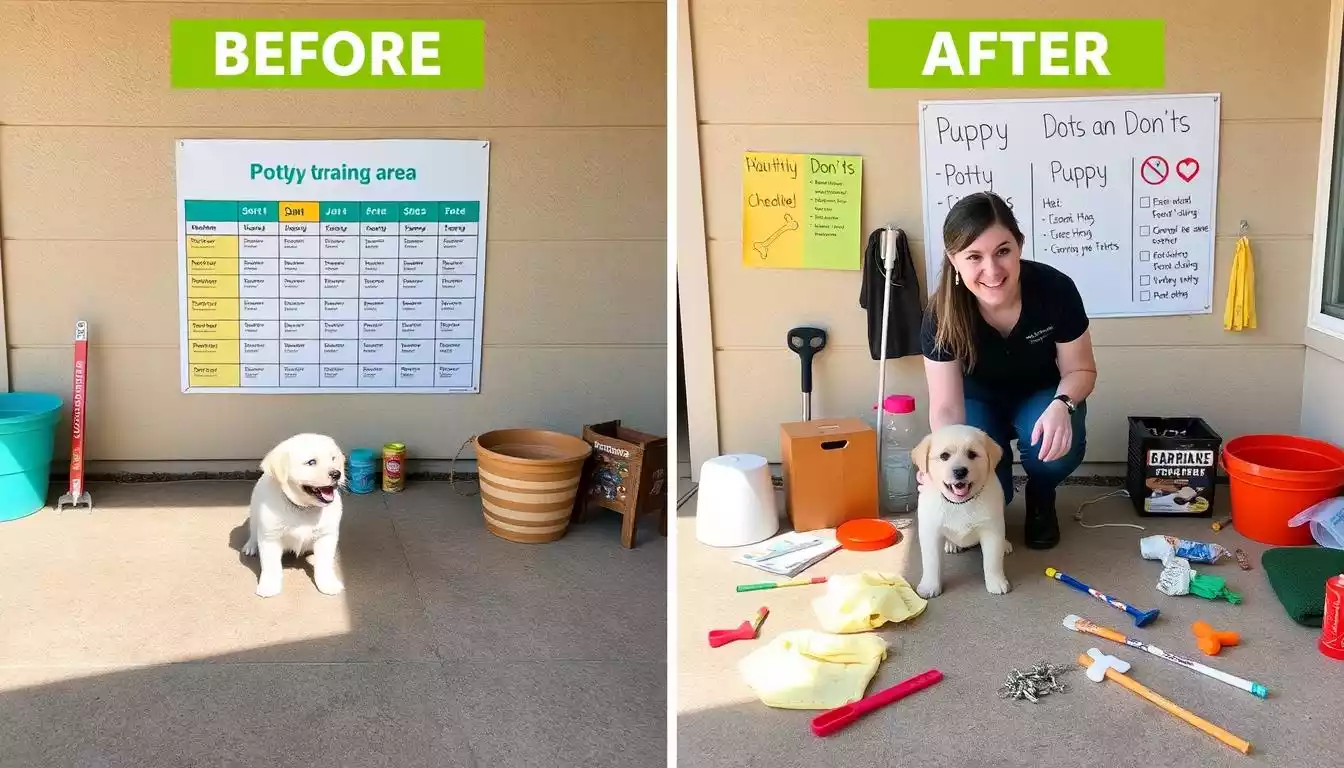
Creating a potty training schedule is key to your puppy’s success. This routine teaches them when and where to go, cutting down on accidents. A consistent daily schedule helps your puppy understand their potty needs.
Daily Routine for Potty Breaks
It’s good to take your puppy out for potty breaks every 1-2 hours. Start with a trip outside in the morning, after meals, after naps, and after play. Also, a break before bedtime helps reduce nighttime accidents. A regular feeding schedule helps control bathroom habits. This routine makes it clear when bathroom trips are needed, helping with potty training.
Importance of Consistency
Being consistent is crucial in training. Watching your puppy closely helps prevent accidents and teaches them the right bathroom behaviour. Using the same words for potty training helps your puppy link the command with the action. Sticking to the schedule speeds up learning and builds good habits in your puppy
How to Potty Train a Puppy in 7 Days
Potty training your puppy in a week is doable with a step-by-step guide to potty train a puppy in a week. It focuses on being consistent and rewarding good behaviour. This plan is a simple way to get your puppy trained quickly.
Overview of the 7-Day Plan
Start your puppy’s bathroom training with a routine that meets their needs. Puppies can start learning as young as 8 weeks old, but they might take longer to understand fully. Teaching them good habits early sets the stage for success later on. A set schedule for potty training helps a lot, making sure you take your puppy out at the right times.
Day-by-Day Breakdown
| Day | Objective | Key Actions |
|---|---|---|
| 1 | Establish Routine | Take the puppy out every hour while awake and praise for successes. |
| 2 | Create Associations | Use a specific spot for potty, linking it to bathroom time. |
| 3 | Enhance Control | Stretch out potty breaks as your puppy gets better at controlling their bladder. |
| 4 | Introduce Crate Training | Start crate training, using their instinct to keep their sleeping area clean. |
| 5 | Strengthen Commands | Teach commands like “go potty” calmly while outside. |
| 6 | Observe Signals | Notice when your puppy needs to go, like when they pace or whine. |
| 7 | Review and Adjust | Look over the week, tweak your plan if needed. |
Stick to this easy plan and use effective potty training techniques for new puppy owners to quickly house train your puppy. This approach not only works well but also strengthens your bond with your pet.
Effective Potty Training Techniques
Using the right potty training methods is key to teaching your puppy good habits fast. A top method is positive reinforcement training. This means rewarding your puppy with treats and praise for good behaviour. This helps your puppy learn faster and respond better to commands.
Positive Reinforcement Methods
Positive reinforcement makes training fun for your puppy. Reward your puppy right after they do their business in the right spot. Celebrate every small success with treats or words of praise. This builds a strong trust and makes learning fun.
By using rewards regularly, your puppy will link potty training with positive feelings. This makes the whole process better.
Using Crates and Confinement
Using crates and confinement helps with potty training, too. Crates keep your puppy safe and secure, reducing accidents. Puppies can hold their bladder for as many hours as they are months old plus one.
Set a schedule for your puppy, like in the morning, before bed, and after meals. This helps prevent accidents. Always watch your puppy closely and keep them safe when you’re not around to prevent accidents.
Recognising Signs Your Puppy Needs to Go
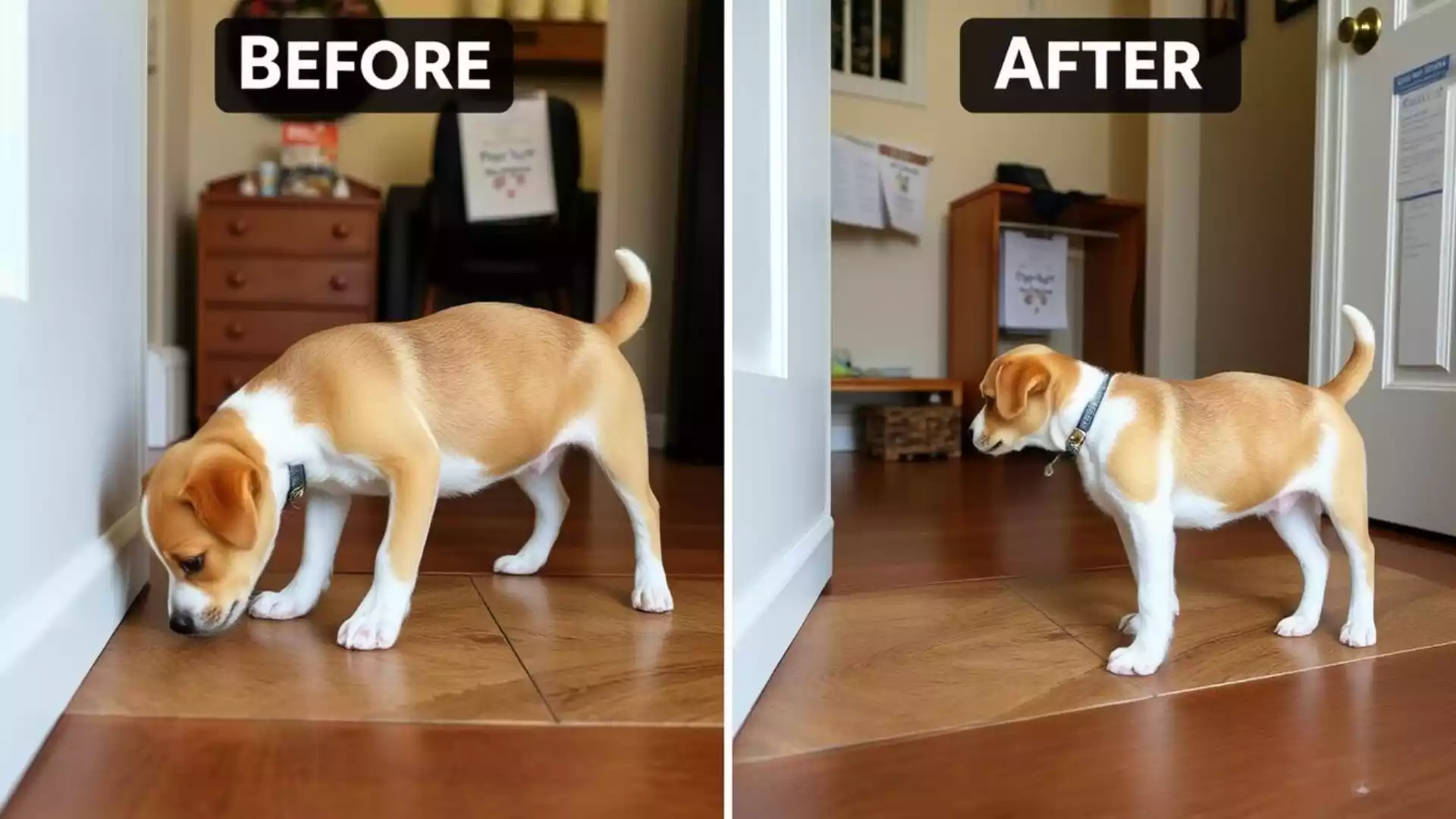
Knowing when your puppy needs to go outside is key to good potty training. By watching for common behaviours, you can cut down on accidents. It’s important to notice signs that show your puppy needs to go, so you can act fast.
Common Behaviours to Watch For
Your puppy may show different signs when it’s time to go outside. Look for:
- Fidgeting or restlessness
- Sniffing around the area
- Circuiting or pacing
- Whining or barking for attention
Seeing these signs can help you learn how to avoid accidents during puppy potty training. Waiting too long can cause accidents inside, so it’s crucial to act quickly.
Timing Your Potty Breaks
To make potty training work, timing your potty breaks is key. Be ahead of the game and take your puppy out:
- First thing in the morning
- After meals or drinking
- After playtime
- Before bedtime
Puppies should go outside once an hour during the day to keep up good habits. Also, having a routine helps them know when it’s time to go. Remember, praise your puppy right after they go in the right spot to encourage good behaviour. Be patient, as it might take time for your puppy to understand potty training.
Avoiding Accidents During Training

Potty training your puppy can sometimes lead to frustrating accidents. It’s important to understand why these mishaps happen. This can help you tackle the question of why your puppy is having potty training problems. Many common challenges and solutions can help you during this process. You might find that reinforcing good habits and changing your approach is key.
Common Challenges and Solutions
Puppies need a potty break every 1-2 hours, especially after eating, playing, or waking up from naps. Accidents often happen when puppies are not taken outside fast enough. Having a consistent feeding schedule can help regulate their bathroom habits. This makes it easier for you to know when they need to go.
If your puppy shows signs of needing to go, like pacing or sniffing the floor, act fast to prevent accidents inside. Remember, if your training seems to go backwards, it’s normal during stressful times for your puppy.
Cleaning Up Properly
It’s crucial to clean up puppy accidents well to stop lingering odours that might make your puppy go there again. Use an enzymatic cleaner to get rid of the smells. You can also use puppy pads for indoor potty areas when you can’t go outside right away. Knowing how to clean up properly helps create a fresh environment that supports your puppy’s training.
Understanding these factors helps you prepare well. Knowing about common challenges and how to clean up can make your training more effective.
Struggling With Puppy Potty Accidents? Fix It the Smart Way
If your puppy keeps having accidents, the problem isn’t you—it’s outdated training methods.
Brain Training For Dogs shows you how to potty train faster by unlocking your puppy’s natural intelligence using gentle, reward-based techniques—created by CPDT-KA certified dog trainer Adrienne Farricelli.
✅ Why This Works Better Than Traditional Potty Training
- 🧠 Targets the root cause of potty accidents (not just surface behaviour)
- 🐶 Force-free & positive training—safe for puppies
- 🚽 Step-by-step potty training system that builds focus & impulse control
- 🎯 Uses simple brain games to improve obedience fast
- 📘 Designed by a certified professional dog trainer (CPDT-KA)
- ⏱️ Works even if you’ve already “tried everything”
👉 Click here to access Brain Training For Dogs and potty train your puppy the right way
✨ One-time access • No harsh methods • 60-day money-back guarantee
Puppy Behaviour Training Tips
Learning how to encourage good habits in your puppy is key to successful potty training. Being consistent with your training helps build strong habits and sets the stage for future behaviours. Using positive cues like “Go potty” helps your puppy link the command with the action, making them easier to train. Regular potty breaks help your puppy learn to hold their needs longer; by 12 weeks, they can hold it for up to 2 hours in a crate.
It’s important to manage your puppy’s energy levels during training. Active puppies may pace, sniff, or bark, showing they need to go outside. Playing with your puppy can help reduce their energy and prevent accidents at home. Puppies need about four meals a day and sleep for 7 hours before needing to go out. Finding a balance between play and rest helps make potty training easier.
Simple routines and consistent reinforcement can greatly improve your puppy’s behaviour. Remember, it can take up to a year for puppies to fully learn house training, so be patient. Paying attention to your puppy’s signs and responding quickly helps them learn consistently. This approach ensures less frustration for both you and your puppy.
FAQ
How long does it take to potty train a puppy?
Most puppies can learn to potty train in about 7 days. This is with a consistent approach and lots of positive reinforcement.
At what age should I start potty training my puppy?
You can start potty training as early as 8 weeks old. But make sure your puppy can hold their bladder and is ready for training.
How often should you take your puppy out to potty?
Take your puppy outside every 30 minutes. This is after meals, naps, and playtime. It helps with regular bathroom breaks.
What supplies do I need for potty training?
You’ll need wee-wee pads, a crate (like the Frisco Fold & Carry Double Door Dog Crate), and treats for positive reinforcement.
What are some common puppy potty training problems?
Common problems include not following a routine, not watching your puppy closely, and missing the signs they need to go.
How can I avoid accidents during puppy potty training?
Keep a consistent potty training schedule and watch your puppy closely. Quickly take them out when they show they need to go to prevent accidents.
Can positive reinforcement really help in potty training?
Yes! Positive reinforcement works by rewarding your puppy for going potty in the right spot. This encourages good behaviour.
What are some effective techniques for potty training a puppy?
Use crates for a safe space, keep a consistent potty training schedule, and reward good behaviour with positive reinforcement.
How do I clean up puppy accidents?
Clean up accidents well with an enzymatic cleaner. This removes odours and stops your puppy from going in the same spot again.
How does a puppy’s energy level affect potty training?
High-energy puppies need more potty breaks. Their excitement can lead to accidents if they’re not taken outside often.

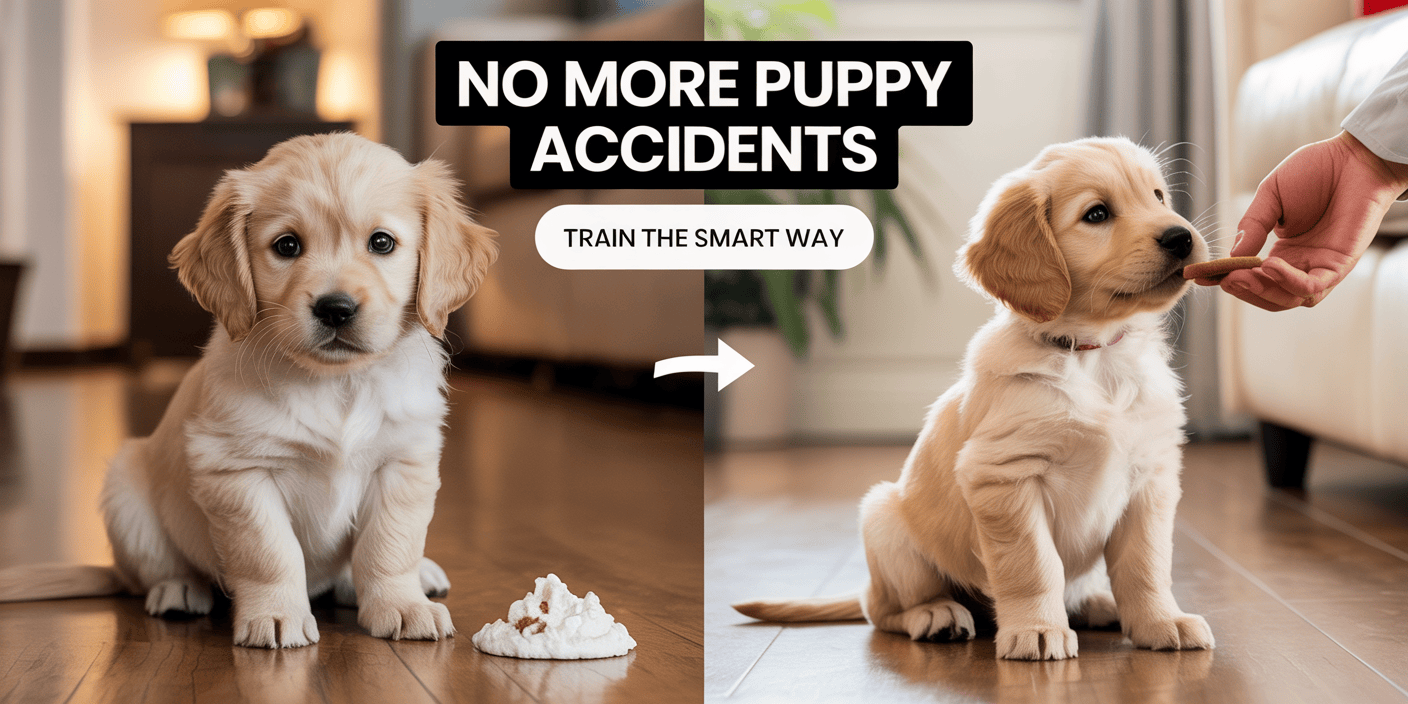
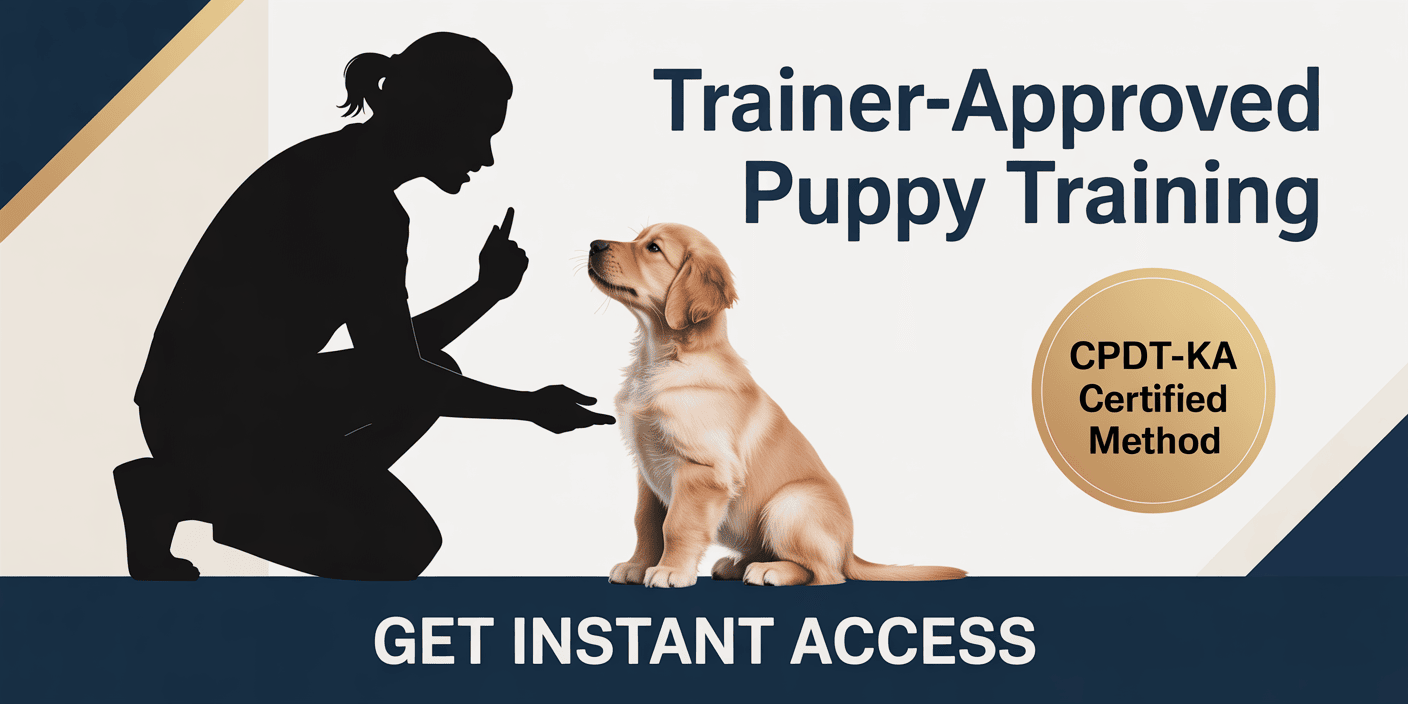
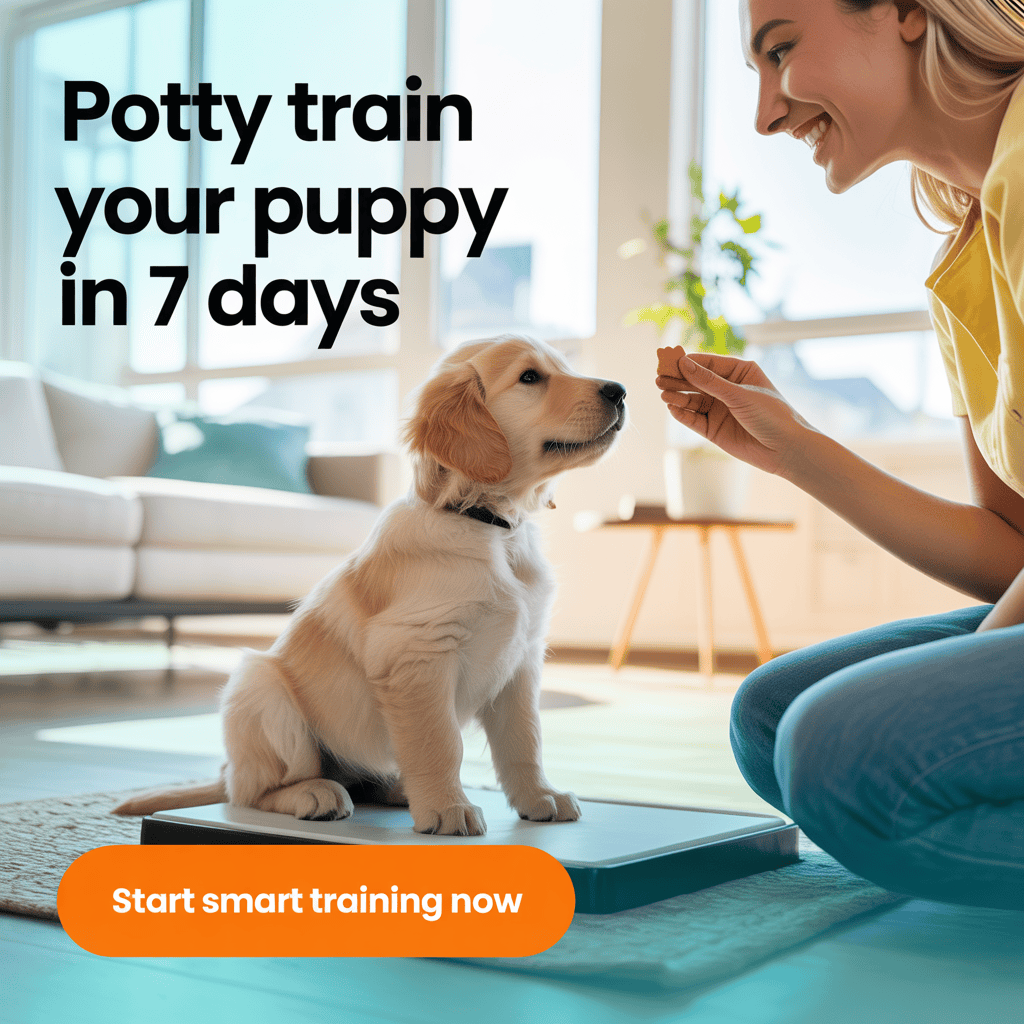
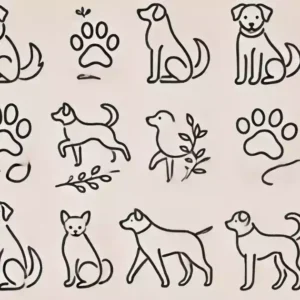
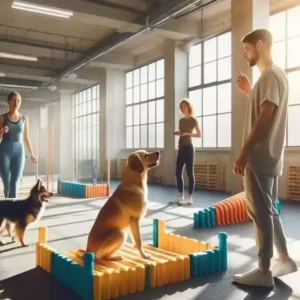
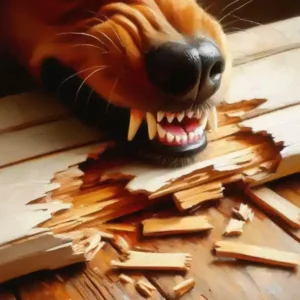
pferderennen hamburg live wetten prognosen (Tiffani)
I got this website from my buddy who informed me about this site and at the moment this time I am browsing this website and reading very informative articles at this time.|
wettquote europameister
My blog … sportwetten anbieter schweiz [Florentina]
Howdy, There’s no doubt that your website could possibly be having internet browser compatibility issues. Whenever I take a look at your site in Safari, it looks fine however, when opening in I.E., it has some overlapping issues. I merely wanted to give you a quick heads up! Other than that, wonderful website.